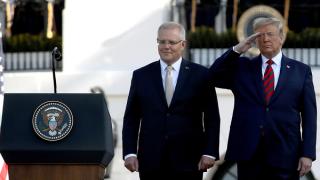US President Donald Trump’s conversation with Scott Morrison, seeking Australian co-operation with a US Justice Department investigation of the Mueller inquiry, is procedurally routine yet politically extraordinary.
Australian and US governments co-operate on law enforcement matters all the time. And unlike the “ask” made of the Ukraine President, we know of no proffer of a quid pro quo, nor a request that Australia facilitate the inquiries of Trump’s personal lawyer, Rudy Giuliani. This appears to be a government-to-government, inside-the-lines request.
But that’s where normalcy ends. There is nothing routine about the context, no historical precedent in the history of Australian-US relations.
With Trump’s impeachment by the US House of Representatives close to a sure thing for later this year, Trump and his supporters are leaving few stones unturned in this effort to portray Trump as victim and a defender of American sovereignty.
This US Justice Department investigation into the origins of the Mueller inquiry — the third such probe — is a pet project of Trump and Attorney-General William Barr, key to Trump’s efforts to delegitimise claims that he benefited from Russian interference in winning office in 2016, that he is beholden to foreign interests and is unfit to serve. With Trump’s impeachment by the US House of Representatives close to a sure thing for later this year, Trump and his supporters are leaving few stones unturned in this effort to portray Trump as victim and a defender of American sovereignty.
Ever since American law enforcement started investigating Russian US election interference, Trump and his supporters have run a counter-narrative: that the claims were fake news, the product of a vast network of “Deep State” operatives actively working against the Trump campaign.
A key tenet of the counter-narrative is that this network was determined to frustrate Trump’s ambition for a robust unilateralism in US foreign policy (“America First”) to replace the tepid, liberal internationalism supported by Barack Obama and Bill Clinton.
Trump’s second attorney-general, Barr, took office in February. Special counsel Robert Mueller sent his report to Barr in late March. Barr’s parsing of the Mueller report and his congressional testimony demonstrated that he is a Trump soldier, willing and exceptionally able in engineering a presentation of the Mueller findings exculpating Trump. When Mueller took umbrage, Barr described Mueller as “snitty”. The house judiciary committee found Barr in contempt of congress.
Behind the state visit to Washington, Australia and the US remain focused and working together on strategic challenges in the Indo-Pacific and a raft of issues. These are the more important matters facing both countries.
With the Mueller report bedded down, Barr went on the offensive, asserting that the US government had “spied” on the Trump campaign. Trump described the alleged activity as an attempted coup and treasonous.
In May, Barr launched a third Justice Department probe into the origins of the FBI’s investigation of Russia’s election interference. Trump said he hoped the investigation would look at Australia. Four days later, Australian ambassador to the US Joe Hockey wrote to Barr offering co-operation. This was an easy yes for the Australian government. The Trump team is obsessed with the genesis of the Mueller investigation and Australia has nothing to hide, presumably. Given the intimacy of the US-Australia intelligence relationship, we gave the Americans a lot of information in 2016. What, exactly, is there to investigate?
Some American pundits repeatedly have asked about the motives of this “Australian diplomat” — our high commissioner to Britain, Alexander Downer. George Papadopoulos lashed out on Twitter on Tuesday describing Downer as a “wannabe spy” and “Clinton errand boy”. But America’s media misunderstands Downer; his political biography is seldom part of the story, so the implausibility of Downer being sympathetic to Hillary Clinton is lost on many Americans.
Unfortunately, the Australian-US intelligence relationship is being dragged into Trump’s partisan counter-narrative. It’s also unfortunate that we learned about it from The New York Times. In turn, this has raised questions about Morrison’s recent state visit as some kind of payback for the Australian help in May. The US-Australia relationship typically sits above partisan politics but this is testing that equilibrium.
It is all an unwelcome distraction. As Australia digested this news, China showed off new weaponry in celebrations of the 70th anniversary of its communist revolution. Behind the state visit to Washington, Australia and the US remain focused and working together on strategic challenges in the Indo-Pacific and a raft of issues. These are the more important matters facing both countries.






